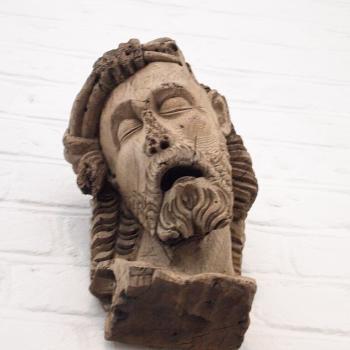
Toxic masculinity creates a false notion of masculinity, suggesting various qualities men should embrace if they want to prove themselves to be “real men.” One of those qualities is strength, and by making it such an important notion for manliness, it shows itself to be an ideology of power and toughness over compassion and mercy. Through its glorification of power and strength, it tells men that they should take what they want from others. The more they do so, the more they prove their strength, and therefore, their manliness. If they don’t, they will prove to be weak, and in that weakness, they will find themselves to be deficient of so-called “masculine virtues.” They must be strong. They must be bold. They must not be overly emotional. They must thrust themselves out in the world and transform it with all their might. While promoters of toxic masculinity suggest its ideologies are necessary for men so that men can truly be what they are meant to be, far from helping them, its embrace hurts them (and those around them).
To teach an ideology of strength, that only those men who manifest and act upon physical strength are worthy of honor and respect, is contrary to the teaching and example of Christ. Jesus, certainly, had strength, but he showed his strength by his willingness to be meek and merciful. He could and did weep when sorrow filled his soul.
The reality of movements which hold onto and promote toxic masculinity is that they create, at best, the appearance of strength. At it is all about appearances, what they promote is illusory; those who follow the ideology of strength promoted by toxic masculine only embrace an illusion of strength because it is much easier to engage than to embrace real strength, internal strength, which has nothing to do with gender but the strength of one’s character. Those who embrace the ideology like to pretend to be courageous, but in reality, they show their fear all the time, a fear that others will take charge through their power and might if they do not take it themselves. No matter how much they exercise and develop the appearance of strength, it is all ephemeral. And despite whatever physical development they have established for themselves, the embrace of toxic masculinity proves that they are weak inside, which is why they are followers of a dangerous ideology. They prove themselves to be weak where it counts: in their moral character.
Those who are truly strong will not care about the appearance of strength. They will not need to apply the use of physical force to make others comply to their wishes. They will not be bullies. Instead, those who are truly strong (men and women alike) will show it by their ability to do what justice expects and requires of them. Justice, true justice, is difficult to attain, and to pursue it requires someone with great character, someone strong enough to endure all that is necessary in order to make sure justice prevails. Ficino, understanding this, said: “He is not strong who succumbs to injustice, but he who overcomes injustice is. For injustice to be conquered a man has to stand firm so that he is not moved from his place by its onslaught.”[1] And so, those who are truly strong are capable of enduring the onslaught of others. They will resist responding to injustice with more injustice, for they will seek to establish justice, even if it means they must endure things which make them look weak and insignificant in the eyes of others. Toxic masculinity does not understand that what it often declares to be a weakness is in reality a true testimony of strength, but Paul, on the other hand, knew this, which is why he proclaimed “For the sake of Christ, then, I am content with weaknesses, insults, hardships, persecutions, and calamities; for when I am weak, then I am strong” (1 Cor. 12:10 RSV).
Jesus is the example of strength, not because he was full of muscles and could command people by the force of arms, but because he emptied himself of all such spectacles and endured the shame and suffering of the cross to the very end. Toxic masculinity would suggest he was weak, but in reality, that apparent weakness was the greatest demonstration of strength in human history. This is why those who would try to use him and make him in the image of toxic masculinity do him and the Christian faith a major disservice. They replace him with an idol which will lead many astray. We should seek the right kind of strength, one not found in muscles and brute force, one, which is not made to represent one gender over the other, but a strength found in a transformed life, a strength found in grace which knows how to accept the cross instead of finding ways around it:
I appeal to you therefore, brethren, by the mercies of God, to present your bodies as a living sacrifice, holy and acceptable to God, which is your spiritual worship. Do not be conformed to this world but be transformed by the renewal of your mind, that you may prove what is the will of God, what is good and acceptable and perfect (Rom. 12:1-2 RS).
We should not be conformed to the world, and the displays of strength shown in the world. Rather, we should hold onto and follow the dictates of justice, no matter how hard they are to follow, and in this way find our true strength. Once we accept our weakness, once we abandon the false pretense of strength, we can gain true strength in God:
He gives power to the faint, and to him who has no might he increases strength. Even youths shall faint and be weary, and young men shall fall exhausted; but they who wait for the LORD shall renew their strength, they shall mount up with wings like eagles, they shall run and not be weary, they shall walk and not faint (Isa. 40:29-31 RSV).
We should pursue justice, and our endurance of hardships for the sake of justice proves our strength far more than so-called feats of strength, for what is established by justice endures, while feats of strength are ephemeral, and even those who once proved themselves strong through such feasts will find that such strength is lost as old age gets the best of them. “Therefore, most humane man, persevere in the service of humanity. Nothing is dearer to God than love. There is no surer sign of madness or of future misery than cruelty. “[2] Love can endure all, while those who rely upon external strength will find that there is a limit to that strength, a time in which it gives out, and then all that they wanted to gain from it will be lost to them. They might believe being brutal towards others will get them the most out of life, but others will treat them likewise, and when their strength faulters, they will find that others will take all they once had from them. When that happens, they will likely experience misery, for they will not have developed the justice they need in order to have their happiness endure. And so, toxic masculinity relies upon an illusion, giving to those who follow it a promise it will not be able to keep. All it offers a lie, and the more people embrace it, the more lives it will hurt, including and especially the ones who embrace the lie for themselves.
[1] Marsilio Ficino, The Letters of Marsilio Ficino. Volume 1. trans. by members of the Language Department of the School of Economic Science, London (London: Shepheard-Walwyn, 1975; repr. 1988), 93 [Letter 49 to Giovanni Cavalcanti].
[2] Marsilio Ficino, The Letters of Marsilio Ficino. Volume 1, 101 [Letter 55 to Tommaso Minerbetti].
Stay in touch! Like A Little Bit of Nothing on Facebook.
If you liked what you read, please consider sharing it with your friends and family!













